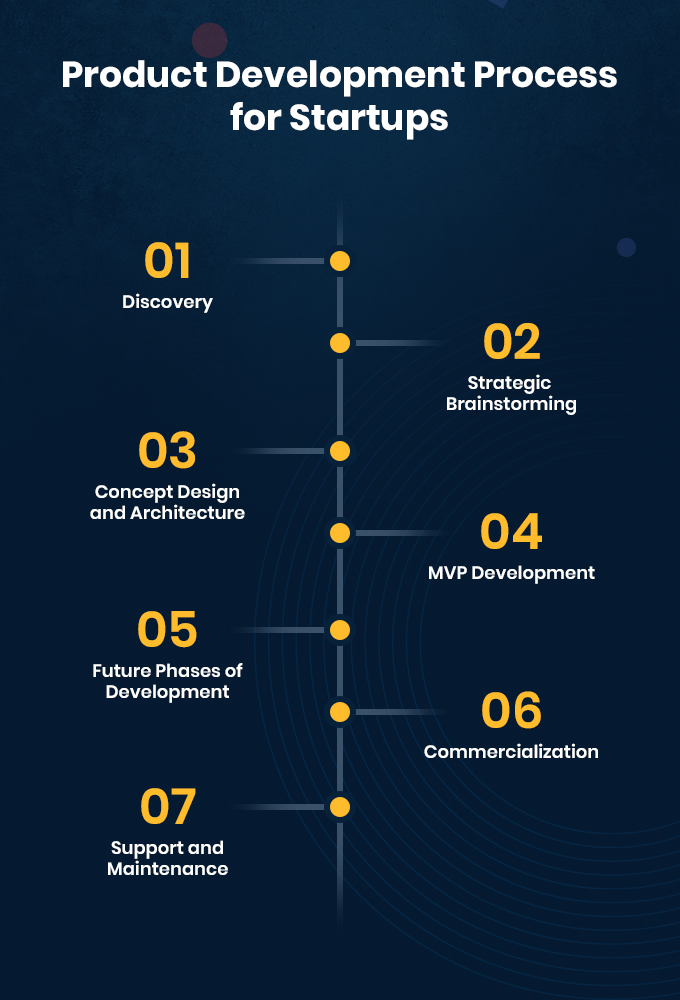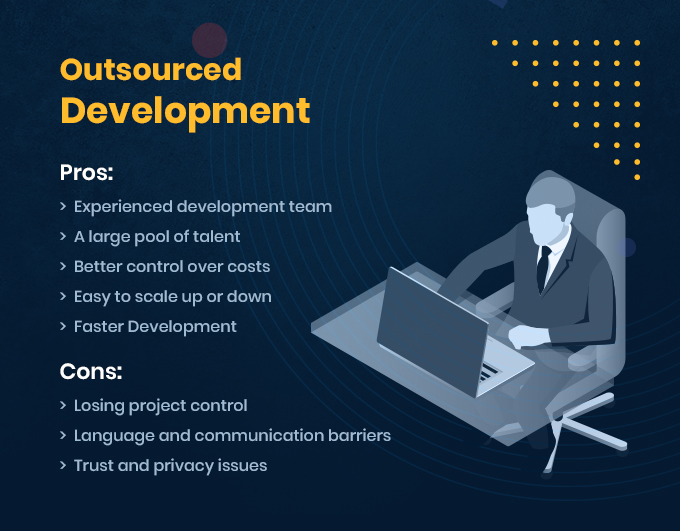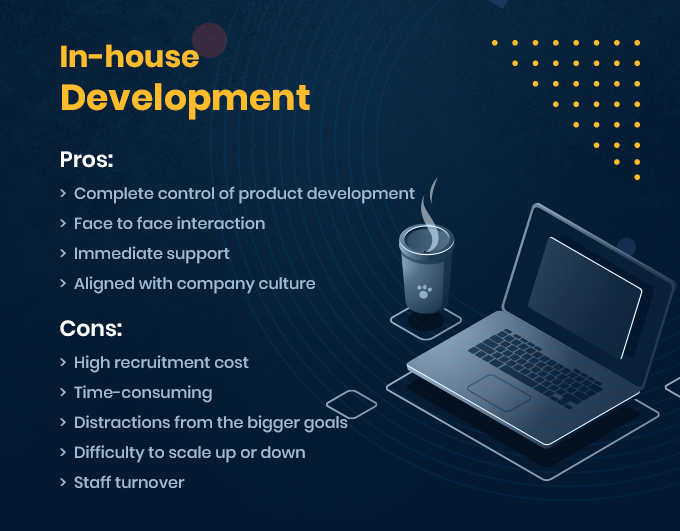Many products that are successful today started out as young startups with just an idea. But is a great idea all it takes to make a startup successful?
The success of a startup and its product relies as much on great product execution as on the idea itself. It is the process of executing the idea into a working product that adds utility and value.
Product execution is crucial for startups because it can determine the fate of their product. That is why most tech startup founders find themselves at a crossroads when it comes to choosing a product development strategy.
Should they set up the infrastructure, recruit employees, and build an in-house product team to get started with the product? Or should they simply outsource the product development to an experienced third-party, i.e., a software development company? The startup outsourcing vs. in-house development dilemma is unavoidable for startups that are planning to launch their new products, but what is the right choice for them?
What is the best product execution strategy? It is difficult to say because both in-house development and outsourcing have their benefits and challenges. There is also a myriad of factors that a startup must consider before making a choice, such as geographical limitations, time constraints, and the budget available for product development. Thus, it is not always an easy decision to make because choosing one or the other sets the course for your product, organisation, profitability, and costs.
If you are a startup founder facing the same dilemma, this is the right guide for you! It covers all the pros and cons of in-house development and software development outsourcing.
We discuss the important factors that help startup founders choose the right product execution strategy for their startups. We unpack everything about the time and cost of startup outsourcing and in-house development. We also walk you through the ideal situations for both product execution alternatives. Our aim is to always help you make an informed decision for your startup.
Understanding the Product Development Process
Let’s first understand the product development process before discussing outsourcing software development for startups vs. in-house development.
The product development process stands for the different stages of the development process. The steps that the development team goes through to transform an idea into a working piece of software. Commonly, this process entails different stages including:
1. Discovery
This is the stage where you plan your product by conducting market research and discovering your product’s right target audience.
2. Strategic Brainstorming
With a concrete product idea, you proceed to brainstorm and prepare comprehensive product plans and business strategies.
3. Concept Design and Technical Architecture
At this stage, you define the design and technical architecture for your product. It is compiled in the form of an SRS document.
4. MVP Development
Investing in developing a product that has no market need is one of the most common reasons why startups fail. Many startups develop a scaled-back version of their final product known as a Minimum Viable Product (MVP) to test out the market potential of their product idea in real market conditions. Although this is an optional step, most startups prefer developing an MVP because it helps them validate their idea, gather market feedback, and reduce the risk of failure.
5. Future Phases of Development
With validated learning through an MVP, startups proceed to develop their product further by adding more features and functionalities.
6. Commercialization
As the final product takes shape, startups begin to market their product, build a brand for themselves, and review their pricing options to achieve their desired profitability levels. This step can occur simultaneously with the final product development.
7. Support and Maintenance
Startups provide customer service and support to their users after the product is launched into the market. Any bugs and issues are resolved for optimal product performance.

The product development process can be performed sequentially or iteratively, depending on the methodology used. Regardless of whether a business owner decides to outsource software development for the startup or chooses an in-house development team, these are the stages that your product will go through before they reach the end-users.
Pros of Startup Outsourcing – Why Should Startups Outsource Product Development
Imagine you are a fashion startup owner: what is it that you’re really good at? Do you excel at programming an iOS application? Or does your expertise lie in understanding fashion trends and reaching your customer base? We are sure it is the latter.
As a startup founder, you should be working on marketing your startup and building your customer base instead of burdening yourself with the responsibility of finding and hiring a development team. This is why outsourcing software development is ideal for startups – because it leaves the technical work in the hands of seasoned professionals while the founders focus on the core business aspects. Here are some of the reasons why startups should outsource product development:
An Experienced Technology Partner
Startup outsourcing means that you can leverage the expertise of a professional software development company for the successful execution of your product without worrying about the technical nitty-gritty.
An experienced partner can save you time by working out the most efficient way to develop your product. With their years of experience, they can also advise you about your product better. Companies that have previously worked as startup outsourcing partners can guide you about your decisions regarding the product, like what technologies are better to use, what features to prioritize, and how to plan the product development.
Startup outsourcing companies are especially experienced at consultation. Since they are familiar with the common roadblocks that are faced by other startups, they help their clients make informed decisions. Software companies are also seasoned at translating your business model and product idea into concrete technical requirements. Business analysts and CTOs at software companies are trained to do this so your product is exactly translated into technical terms that developers can work with.
Thus, you don’t have to struggle to transfer your product and business knowledge to the technical team.
Better Control Over Costs
The cost of startup outsourcing is the most common reason why startup founders choose to outsource over in-house development. Startup outsourcing gives you better control over costs to help you stay within budget. The cost of product development includes many different types of expenses and one of the major components of development costs is the remuneration of the resources.
With startup outsourcing, you do not have to worry about the individual cost components because when you hire a company, you pay them by the hour for their services. This covers the cost of labour, technologies, and other overheads.
Outsourcing startup development is a cost-effective alternative because hiring local human resources in regions such as the UK and USA can be very expensive due to the high salary rates. Nascent startups in the region can hire developers with the same level of expertise for a significantly lower cost by outsourcing to companies in other parts of the world such as eastern Europe or Asia.
Have a specific budget in mind?
We provide custom software development services that are specially curated to suit the needs and budgetary considerations of startups like yours!
Learn More About Our Pricing
Freedom To Scale Up Or Down
The scope and offerings of your product are not set in stone. You might begin your startup with a very specific product idea but it will most likely change in the long run. For this, you need the ability to change your team based on your changing requirements.
With startup outsourcing, you have the liberty to scale your team up or down easily, allowing you to add new technology experts to your team based on your changing product requirements. If there are certain technology experts and resources that you do not require full-time, startup outsourcing companies allow you to add team members with flexible work contracts.
Faster Development
Startups focus on getting their products in the market as swiftly as possible to capture the market share without losing it to competitors – time is of the essence.
Outsourcing startup development means that you can get started with the development of your product faster. Startup outsourcing companies can save you time by providing ready-to-go product teams. So you can save time that would otherwise be spent putting together a team.
To discuss your requirements and product idea, you will be required to collaborate closely with the software company. This is known as the discovery phase. Development work can begin soon after it, meaning that you can jump-start the development process in a matter of weeks.
The Right Development Team
The success of your startup depends heavily on the development team. And building a team that perfectly fits your requirements is a daunting task. Startup outsourcing saves you the trouble of putting together a skilled product team.
Most companies have a wide pool of talented resources and they analyze your budget, requirements, and technical specifications to compose a team of experts for you. You have the flexibility to choose dedicated team members that you deem fit and you can also hire part-time resources to add to your software development team.
Focus on Business Goals
Startup founders have a lot on their plate, from securing funding, product development, and marketing to other important business matters. With startup outsourcing, they can relieve themselves of the added responsibility of recruiting a product development team. This way they can save time and money and focus on the bigger business goals.
Challenges of Startup Outsourcing
While software outsourcing is a popular choice for startups because it saves them time and money, there are some challenges that they can face along their outsourcing journey. These are obstacles that make outsourcing a bit demanding but they can be overcome with better decision-making.
Communication Gap
The product development process requires startup owners to work closely with the technical team throughout the development lifecycle. However, communicating with the team can become a challenge when you are not working from the same physical location.
The lack of face-to-face interaction can result in various communication issues between you and the development team. These can have serious consequences. Things can get lost in translation, miscommunicated or misinterpreted easily. However, the communication gap can be reduced by using efficient collaboration and management tools and having regular meetings with the team.
Losing Project Control
Startup owners are always passionate about their products and want to stay in control of every aspect of product development. Since they do not have direct access to the development team after outsourcing, they fear they might lose control of the project to the outsourcing company. Sharing control with the outsourcing company over project management, product testing, or other important matters can be troublesome. However, startup outsourcing needs both parties to have trust in each other.
Startup owners can also hire a dedicated development team that works exclusively on their product to complete control over matters.
Security Issues
Their idea’s originality and intellectual property are the two most valuable things for a startup, and outsourcing means sharing it with a third party. Trusting an outsourcing company with your idea, groundwork, and business plan can pose some security and privacy risks. However, a good software outsourcing company will always sign an NDA and uphold the confidentiality terms to protect your intellectual property.

Pros of In-House Development: Reasons To Keep Product Development In-House
While software outsourcing is a cost-effective solution for product execution, many startups prefer to keep product development in-house. They directly hire developers and put together a product team that can work with them on building the product.
Here are some of the reasons why startups may prefer an in-house development team over software development outsourcing.
Face-to-Face Interaction
Startups that want to stay directly in touch with the development team choose to keep product development in-house. They prefer to have the developers in the same physical location so they can communicate directly with them. Giving them complete control over the development process.
With an in-house development team, startup owners can share their feedback and implement changes by communicating with them in person. Direct conversations speed up discussions by avoiding miscommunication and increasing overall effectiveness. If you also want a development team that you can interact with in person, then in-house development would be suitable for your startup.
Cohesive Team Culture
Differences in culture and language can hinder your ability to efficiently collaborate with your development team. With in-house development, you don’t have to worry about it. Your in-house development team is aligned with the startup culture and has the same core values as your company. You can attain complete synergy with your in-house team and achieve efficient collaboration and better results in the long run.
Complete Control Of Product Development
Outsourcing software development for startups means giving up some control over the product development process, especially if your outsourced team is simultaneously working on other projects and clients. An in-house development team, on the other hand, works exclusively for your startup and the team members often work within the same physical space as you. This means you have full control over all the aspects related to product development, such as the project management style, working hours, and the timeline of deliverables.
Quick Product Changes
Startup owners can quickly get changes implemented in their products by communicating efficiently and having complete control over product development. The in-house development team can run quick iterations to incorporate changes based on market feedback or provide instant support in case of bugs and errors.
This may be difficult to achieve with an outsourced team as things are bound to get slightly delayed. If a startup doesn’t have a clear product idea and expects its software product to go through plenty of changes, in-house development would be a more suitable option.
Challenges of Keeping Product Development In-House
Startups prefer keeping the development of their first product in-house because of the aforementioned benefits, but there are some huge challenges they can face due to in-house development.
Higher Costs
Startups often have limited funds to consider the costs of in-house development. Building an in-house team means that the startup not only has to pay the salaries of the human resources but also bear a long list of additional expenses. These include the cost of:
- setting up and maintaining an IT infrastructure
- technology training
- software licences
- the hidden costs of employee benefits, paid leaves, and social security.
Let us also not forget the fact that the cost of recruiting multiple resources is significantly high.
Comparing the cost of outsourcing software development for startup vs. in house development shows that outsourcing only costs a fraction of the total cost of in-house development. The budget constraints faced by startups keep them from in-house development because they do not have the funds to set up an office space, main IT infrastructure, and employ experienced developers.
Distractions From The Bigger Goals
In-house development requires the startup owner to constantly invest their time, money, and efforts towards the development team, which can distract them from their fundamental business goals. Managing the day-to-day work of the in-house team means that the startup owner is left with less time to spend on other core business matters. By outsourcing, you can make time to focus on the marketing strategy for the product, long-term business goals, customer relationship management, and networking.
Time-Consuming
Searching for the right talent, vetting them, and recruiting and onboarding them can take a month, or even longer. This is because finding the best resources for your development team is a time-consuming process due to the high competition in the job market by other recruiters. The months you spend putting together a team will only delay your product development process. And the longer it takes for a startup to launch its product, the higher the chances are of being outcompeted in the market.
Scalability Issues
An in-house development team means the startup is responsible for managing its employees. This poses problems of scaling the team up or down. In case the requirements of your product change and compel you to scale up by adding more technology experts to your team, you will have to go over the long recruitment process again, which will cost you additional time and money. Similarly, scaling down the team means you will have to terminate the employment contract of some of your team members.
In short, it is highly inconvenient to scale the in-house team up or down. This means that many startups either have to work their team too hard, or keep a large team even when there is less work to be done.

Comparison: Hiring a Startup Outsourcing Company vs. Recruiting an In-House Development Team
The debate of outsourcing developers for startups vs. in-house development comes down to two most important factors, cost and time.
Cost
The cost of startup outsourcing depends on a number of factors. These include the technical requirements of the product, the scope of the product development project, the location of the software outsourcing company, and the size of the team.
Considering these factors, the cost of development can fall anywhere between £10,000 to £1,000,000+. However, whatever the cost of startup outsourcing may be, it is always significantly lower than the cost of in-house development because of the additional costs that are incurred by the startup.
The cost of putting together an in-house development team includes the following costs:
- Cost of hiring the development resources
- Salary/Compensation of the developers
- Cost of setting up and maintaining an IT infrastructure
- Software licensing fees
- Cost of onboarding and training resources
- Cost of paid employment benefits (leaves, health insurance, social security etc.)
- Overhead costs
On the other hand, startups can pay an outsourcing company for all of the development expenses depending on their engagement model. The cost of startup outsourcing will cover the following:
- Salaries of developers
- Cost of project management
- Cost of quality assurance and design
- Any other development-related expenses
Whatever your budget, the software outsourcing company will put together a team of technical experts for you that is the best fit for your startup. So you do not have to worry about any of the expenses.
Looking to partner with a reliable and experienced software development company?
For 16+ years, we have helped up-and-coming startups like yours reach new heights of success with our top-notch software development services for startups. We offer free consultation and time and cost estimates for startup software development.
Learn More
Time
Time and cost go hand in hand and it is important for a startup to reduce their time-to-market. The fierce competition in the market makes time an essential factor in establishing/determining the success of a startup.
With in-house development, the recruitment of the best talent can take a long time. According to Workable, a leading talent acquisition software, the average time of hiring an IT expert can be around 30 days. Next comes the time of setting up the team and, in some cases, providing them training. This means even with the best odds, your product development process may get delayed by a month or more.
With outsourcing, startups can spend some time looking for and vetting software outsourcing companies. Platforms such as Clutch, Manifest, and GoodFirms are great resources. They help you find trusted software companies that can speed up your search process.
Once you find the ideal outsourcing partner, you can spend a few weeks discussing your budget and product requirements. The software company can assign a team of experienced resources to begin the product development process. This process can take as little as a few weeks and save you a lot of time.
Frequently Asked Questions
Why should I consider outsourcing software development for my startup?
Outsourcing software development is ideal for your startup if you lack the technical know-how of software product development. Most startup owners belonging to non-technical industry verticals choose to outsource the development of their products to professional software experts so they can focus on the core business processes and goals.
How do I find the right software development outsourcing services company?
Finding the right software development company is the most important step on your startup journey. To make the right decision, take your time reviewing and vetting software outsourcing companies. Analyse their project portfolios and client reviews.
Rating and review platforms like Clutch, Manifest, and GoodFirms are good resources to consider. They help you find the right software development outsourcing partner for your startup.
How much does software development outsourcing cost?
Outsourcing software development for startups is a cost-effective choice because it less expensive than in-house development. The cost of outsourcing depends on the following:
- rates of the software development company
- technical requirements of your product
- scope of the product development project
- location of the software outsourcing company
- size of the development team.
Considering these factors, the cost of development can fall anywhere between £10,000 to £1,000,000+.
The Final Verdict
Here’s the final verdict for startup owners that are confused about in-house development vs outsourcing! Startup owners should always take a look at the difference in time and costs between outsourcing and a full-time in-house development team because that difference alone will help them decide the best option for their startup.
Startup outsourcing is the most viable option for you if you face the following conditions:
- Budget constraints: The cost of startup outsourcing is significantly lower, so if you are a startup that has budget constraints and you are looking to get great code quality for your software product
- Lack of talent: If you are struggling to find talent development resources in your city and you want to save time
- Tight deadline: If you are on a tight deadline and want to kickstart the development of your product as quickly as possible
- Non-technical: If you lack technical knowledge, are unclear about your product idea, and want an experienced technical partner to refine your product idea.
In contrast, in-house product development is best suited for your startup if you meet the following conditions:
- No budget or time constraints: If you have a significant amount of funding at your disposal and you don’t need to rush the development of your product
- Complete control: If you possess technical knowledge and want to be personally involved with product development at a micro-level.





